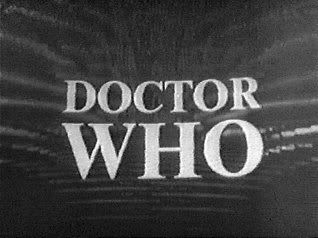
Doctor Who
I’ve talked a lot about Doctor Who and its recent sister shows on this blog. I know. And I can’t promise that I won’t talk about them again (especially because we get to see a new Doctor in the spring), but I’ve finally finished all of the Doctor Who episodes to date.
Yes. All of them.
I’ve spent quite a while trying to figure out how to talk about this series. I mean, this is nearly 50 years worth of show with ten different actors playing the main character. That’s a lot of science fiction to talk about, even if I just stick to basic summaries and impressions of the show. That’s not even going into science fiction conventions changing over time or the representation of the commonly accepted social views in the show. That’s not even taking a look at the fragments of analyses that a few of you have heard me ramble about in other media. I could write about Doctor Who for my entire life and not run out of things to say.
So, I figured the easiest way to do this would be to go through the Doctors themselves and tell you what I liked and disliked about them.
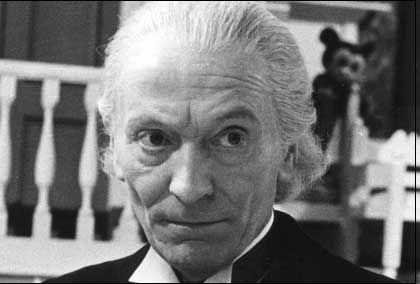 |
The man who started it all, William Hartnell. Honestly, I probably found this Doctor to be the most exciting because he was the first. He started everything1 that we all know and love about Doctor Who. Watching him was like watching a monumental historical event, which, in a way, it was. The first Doctor. The first TARDIS reveal. The first companions. The first Daleks. The most fundamental elements of Doctor Who.
And what’s more is William Hartnell was a very talented actor, despite his stuttering and line fudging. His fun-loving, mad scientist Doctor was just intriguing and alien enough to draw people into the show in the 1960s and he was the perfect start to this show.
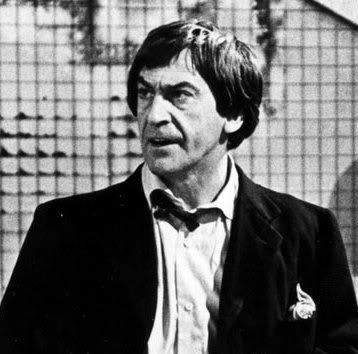 |
While William Hartnell started the Doctor Who phenomenon, Patrick Troughton’s Doctor was the one who ensured that the show would go on. If people hadn’t believed that his Doctor was the regeneration of William Hartnell, Doctor Who would not have become the show it is today. While Troughton’s Doctor was a seemingly younger, more active, and more mad man, he brought a new life to the show. He also brought us the iconic sonic screwdriver, which I’m sure we are all grateful for. His Doctor was a fun loving, musical Stooge, yet he seemed like a natural progression of the character. He was tired of being so old in his older body and took advantage of his new youth.
Also, Troughton’s Doctor traveled with my favourite companion, who has his own post on my blog HERE.
Unfortunately, many of Hartnell’s and Troughton’s episodes have been lost. Although recreations have been made using the recovered sound tracks and set photos, it isn’t quite the same as watching the episodes for real.
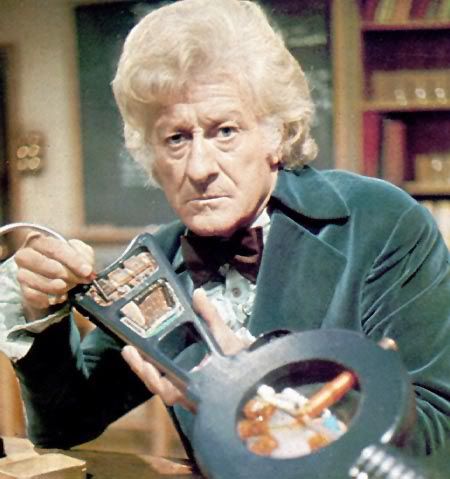 |
From Patrick Troughton to Jon Pertwee, we move on to the Third Doctor. This was an interesting period in the Doctor’s life. At the end of his second self’s term, he was sentenced to exile on Earth in the 20th century, so the majority of his time was spent stranded with Britain’s UNIT (United Nations Intelligence Taskforce) division with a TARDIS that could travel through neither time nor space.
I personally really enjoyed the Third Doctor and his limitations in this period, but I can see how people might not have liked it as much as the past two. This Doctor is a bit more obviously arrogant than the past two2 and there is an obvious tension between him and the authority exercised by UNIT, but I feel that he learns to be more tolerant of and personable to more people during this time than in typical Who adventures. Usually, he makes a few friends on each adventure, but he doesn’t have time to really learn about the people involved on a personal level. Seeing him interact with the same culture of people for an extended period of time was interesting from a psychological stand point.
But even if you didn’t enjoy this Doctor’s personality, you had to enjoy his snazzy dress sense and excellent taste in cars. Velvet jackets, capes, and a yellow roadster? You can’t really go wrong there.
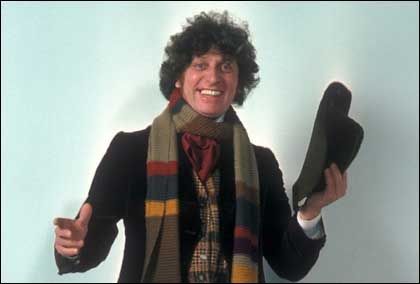 |
Tom Baker. The Fourth Doctor, with his long colorful scarves, wild curly hair, and manic periods of both silliness and genius, is the longest running Doctor to date. Tom Baker held the role for 7 or 8 years and is the most popularly recognizable Doctor of the lot. He had some high expectations to meet and he did so brilliantly.
Of all the Doctors, the Fourth is probably my favourite3. He could spout off a great technical explanation about the problem at hand, forcing you to pay attention to the seriousness of the situation, and then he’d follow it up with a hilarious one-liner that would have you rolling on the floor. And frankly, he some of the best companions. K-9. Sarah Jane Smith. Romana.4 The banter between him and these companions was golden.
He also had one of the worst. I couldn’t stand Leela. However, she didn’t detract from his awesomeness, so no harm done.
And there was a period of Tom Baker’s reign in which scripts were being written by Douglas Adams. You can’t go wrong there.
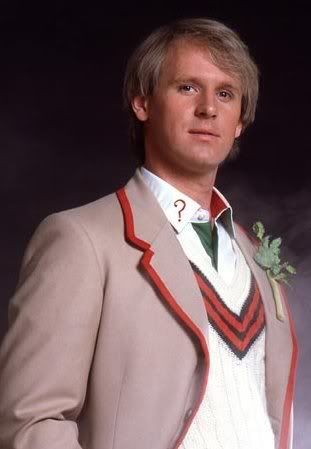 |
Another of the most iconic Doctors, Peter Davison donned a cricket uniform and stuck a stalk of celery in his lapel, which may sound ridiculous, but his Doctor ended up being of the warmest characters in the show. If any of the Doctors were to give you a hug at the end of a bad day, it would be the Fifth Doctor. The whole celery thing is quickly pushed to the back of your brain.
There was also an element of the Fifth Doctor that I found particularly intriguing. Even though Davison was the youngest actor playing the Doctor, he was the most fatherly in the role. Some of his lines in regards to his companions were classic dad lines. For example, Nyssa and Tegan once confronted the Doctor about his seemingly harsh treatment of Adric and the Doctor replied with something along the lines of, “If I coddle him, he won’t learn anything.” And, of course, Adric and the Doctor then have a stereotypical misunderstood son episode. It was fascinating for me to se that kind of maturation in the Doctor.
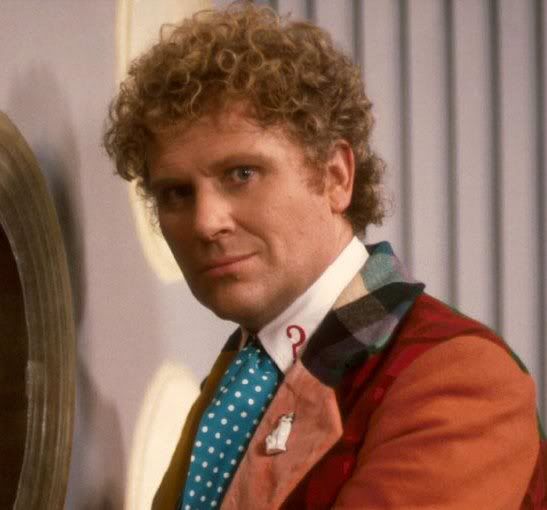 |
The Sixth Doctor was played by Colin Baker and while I enjoyed the adventures presented, I think this Doctor could have been cast differently and I would have enjoyed this chapter of the Doctor’s story better. The Sixth Doctor was a bit abrasive and prone to wild mood swings, which made him unlikable at times. He also had two of the most annoying companions of the lot.
Like I said, I enjoyed the adventures. The stories were well written and tackled some interesting topics, but I can’t really say that I am a fan of all aspects of the Sixth Doctor himself.
 |
Sylvester McCoy took the role after Colin Baker and I was glad to see a Doctor that was much more classical in his mannerisms and outlook. The Seventh Doctor often resembled Pertwee’s Third in his mannerisms and Troughton’s Second in his silliness. I’m not entirely sure that the writing was up to par with past episodes, but I enjoyed them anyway.
Unfortunately, by this time Doctor Who was winding down and enthusiasm for the show was dissipating and the Doctor left the screen for shortly after McCoy’s start. I felt he had more adventures to show us and, with some better writing, he could have been superb.
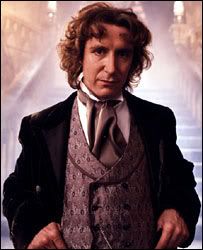 |
Paul McGann was an odd Doctor. He was cast in one movie only, rather than a TV series. Honestly, I don’t believe that this movie gave us enough of the character to form a comparative opinion of him versus the other Doctors, especially because he spent half of the movie regenerating/figuring out who he was because of amnesia, but I’m not sure I like where he was headed in what we did see. The movie jarred when compared to the rest of the series because it was so blatantly and stereotypically 90’s and it was bafflingly American. There was kissing and black leather trench coats with shades5 and teenaged Asians from the wrong side of the tracks. Very odd.
While those stereotypical conventions of teen 90s movies amused me because they were present, I’m not entirely sure that I liked it.
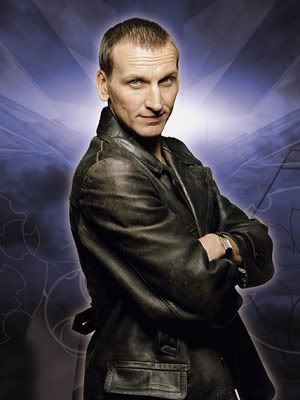 |
The Ninth Doctor (Christopher Eccleston) will always be one of my favourite Doctors. Although I’ve always known what Doctor Who is and could recognize the Who conventions, the Ninth Doctor was the first Doctor that I actually sat down and watched.
And he was fantastic. Although visually different from all the Doctors in the past (buzzed hair and leather jacket over a jumper), he fits in well. He has moments of aloof goofiness followed by very dark, quiet moments. You can see that this Doctor had gone through something traumatic (the Time War), but he was still the same man underneath, which is really cool to watch now that I’ve seen all of the other Doctors. And considering that his season started nearly twenty years after Doctor Who had left the regular airwaves, that’s very impressive.
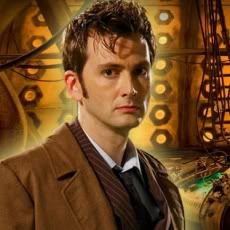 |
David Tennant’s Tenth Doctor is an interesting subject. When I first started watching him, I really enjoyed his tenure. He was hyper and smart and willing to jump feet first into everything. I wasn’t a fan of the blatantly increasing arrogance, but there are some spectacular stories among his episodes. But I think that if you started watching Who with him, and are not necessarily invested in the stories of characters, you’d like him better than I do.
Mainly, though, my problem is not with the actor himself but with the drama that happened with the producer and writing team. I try not to let that affect my judgment of that Doctor, but I could see Russell T. Davies’ tantrums and dislike of certain situations evident in his episode writing, which infuriated me. I do not watch these shows for his issues; I watch for the characters and stories. I couldn’t help but smile when the Tenth finally regenerated.
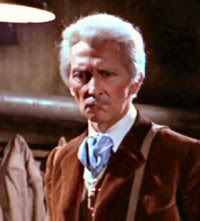 |
I’ve also had the unique experience of watching a sort of spin-off Doctor.
Peter Cushing.
After the initial success of the Doctor Who episodes of the early 1960’s, there were two Doctor Who movies made. Peter Cushing starred as the Doctor in both of these movies6 and, even though parts of the characters and story were changed, it was still Doctor Who- fun and full of time and space adventure. It was interesting for me to see what was changed and what was kept in, but my brother, who is slowly catching up on all the episodes (don’t worry, he’s more than halfway there… on Peter Davison, I think), was annoyed with the changes and we decided that this Doctor lives in an alternate universe.
Anyway, I’m really glad that my dad found these. It was really cool to see a reinvention of the show that followed so closely to the original.
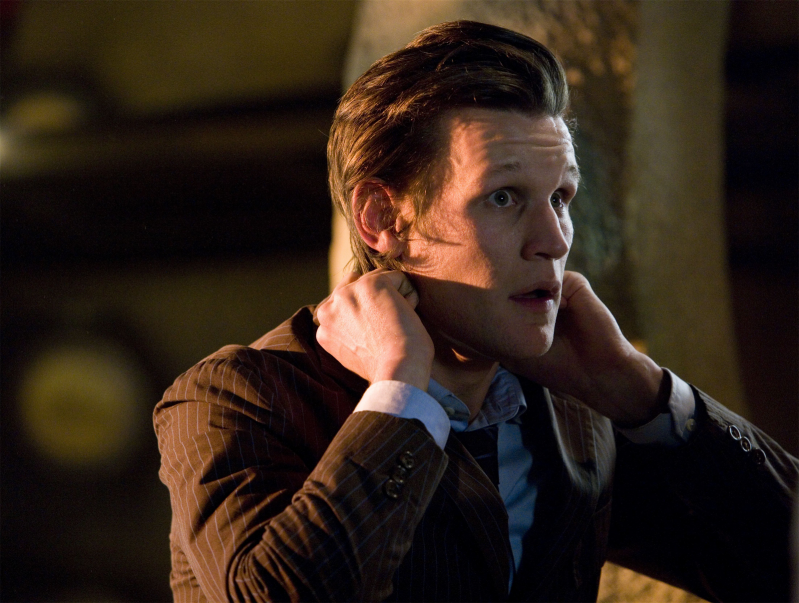 |
This past weekend gave us Matt Smith as the Eleventh Doctor. I’ve only seen the one episode, but what I have seen is very promising. There are parallels with this regeneration to past regenerations and at the height of this first episode, all eleven doctors are shown to the audience. There’s already a sense of loyalty to the classic Who episodes by this team that I felt was lacking in the last one. I’m excited to see more from this Doctor and writing team.
1 Nearly.
2 They all have a higher degree of arrogance when compared to their human companions. The companions are usually fairly ignorant of time travel and alien worlds, even though they might have expertise in some other area.
3 It’s hard to tell for sure because I absolutely loved most of them.
4 I found Romana II to be a bit annoying, but the Key to Time series was one of the best of the entire series.
5 Which is a bad look for the Master.
6 Fun Fact: Bernard Cribbons, who plays Donna’s granddad in New Who, was a companion of Peter Cushing’s Doctor in The Dalek Invasion of Earth 2150 A.D.






No comments:
Post a Comment